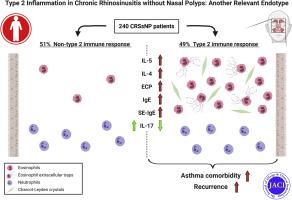Journal of Allergy and Clinical Immunology ( IF 14.2 ) Pub Date : 2020-05-15 , DOI: 10.1016/j.jaci.2020.04.040 Tim Delemarre 1 , Gabriele Holtappels 1 , Natalie De Ruyck 1 , Nan Zhang 1 , Hans Nauwynck 2 , Claus Bachert 3 , Elien Gevaert 1

|
Background
Chronic rhinosinusitis without nasal polyps (CRSsNP) is mainly considered a type 1 mediated disease. The role and clinical significance of type 2 immune responses in CRSsNP have not been addressed sufficiently; a recent cluster analysis for CRS described the existence of a subgroup of patients with CRSsNP with a type 2 inflammation.
Objective
We aimed to characterize the underlying type 2 immune response and its clinical significance in patients with CRSsNP.
Methods
A total of 240 patients with CRSsNP were endotyped and subdivided on the basis of expression of marker cytokines. Clinical data such as recurrence, comorbid asthma and allergy, and numbers of blood eosinophils and neutrophils were collected from all patients. A selection of 15 patients was further characterized for the presence of eosinophils, neutrophils, Charcot-Leyden crystals, and eosinophil extracellular traps in the mucosae.
Results
A type 2 immune response with increased levels of IL-4, IL-5, eosinophil cationic protein, IgE, and Staphylococcus aureus enterotoxin–specific IgE was observed in 49% of patients with CRSsNP. Those patients showed increased numbers of blood and tissue eosinophils, and they displayed a considerable eosinophilic inflammation associated with eosinophil extracellular trap cell death and Charcot-Leyden crystals. A significantly increased prevalence of recurrence and asthma was observed in patients with type 2 CRSsNP compared with in patients with non–type 2 CRSsNP. However, only 4 of 117 patients with type 2 CRSsNP developed nasal polyps within 12 years.
Conclusion
This study shows that type 2 immune responses in CRSsNP follow similar patterns but are less pronounced than in chronic rhinosinusitis with nasal polyps. Also CRSsNP with a moderate type 2 immune response showed a considerable eosinophilic inflammation with clinical impact.
中文翻译:

无鼻息肉的慢性鼻-鼻窦炎的2型炎症:另一种相关的内型。
背景
无鼻息肉的慢性鼻-鼻窦炎(CRSsNP)主要被认为是1型介导的疾病。2型免疫应答在CRSsNP中的作用和临床意义尚未得到足够的研究;最近对CRS进行的聚类分析描述了患有2型炎症的CRSsNP患者亚组的存在。
目的
我们旨在表征潜在的2型免疫应答及其在CRSsNP患者中的临床意义。
方法
共有240例CRSsNP患者根据标记细胞因子的表达进行了内分型和细分。从所有患者中收集了诸如复发,合并症哮喘和变态反应以及血液嗜酸性粒细胞和中性粒细胞的临床数据。对15名患者的选择进行了进一步表征,表明其在粘膜中存在嗜酸性粒细胞,嗜中性粒细胞,夏科特莱顿晶体和嗜酸性粒细胞胞外陷阱。
结果
在49%的CRSsNP患者中观察到2型免疫应答,其中IL-4,IL-5,嗜酸性粒细胞阳离子蛋白,IgE和金黄色葡萄球菌肠毒素特异性IgE水平升高。这些患者的血液和组织嗜酸性粒细胞增多,并且表现出与嗜酸性粒细胞胞外捕获细胞死亡和夏科-莱登晶体有关的嗜酸性炎症。与非2型CRSsNP患者相比,2型CRSsNP患者的复发和哮喘患病率显着增加。但是,117名2型CRSsNP患者中只有4名在12年内出现了鼻息肉。
结论
这项研究表明,CRSsNP中的2型免疫反应遵循相似的模式,但不如具有鼻息肉的慢性鼻-鼻窦炎明显。具有中度2型免疫反应的CRSsNP也显示出严重的嗜酸性炎症,并具有临床影响。


























 京公网安备 11010802027423号
京公网安备 11010802027423号